Q&A with Lara Stolman on Award-Winning Documentary “SWIM TEAM”
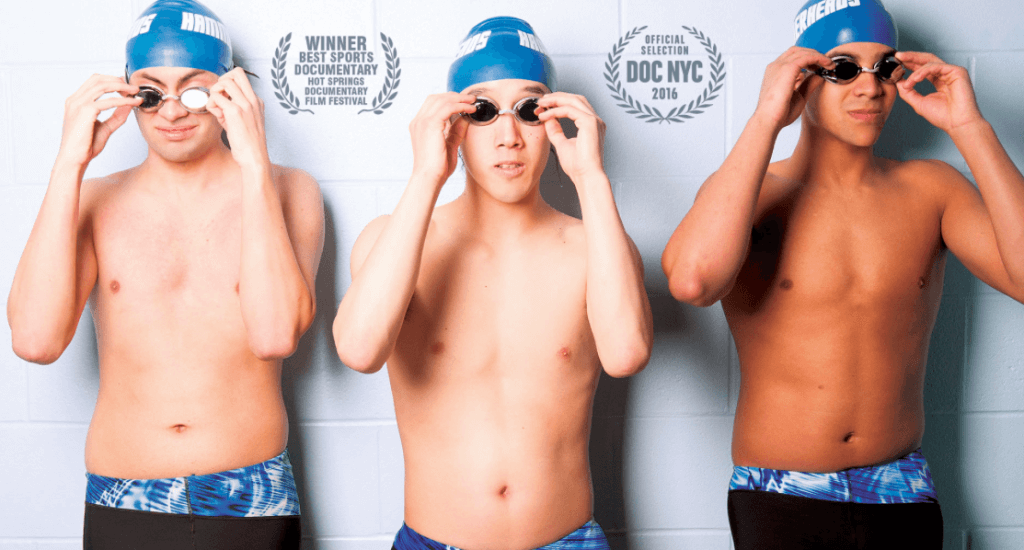
By Colin Hogan, Swimming World College Intern.
Lara Stolman directs and produces the new documentary “Swim Team” that is making the rounds in film festivals across the country. “Swim Team” follows Kelvin, Robbie and Mike Jr. (or Mikey) of the Jersey Hammerheads, a swim team where every member falls on the autism spectrum. The team is coached by Mike McQuay, or Coach Mike out of Perth Amboy, New Jersey.
It’s a raw portrait of growing up–the boys navigate training, school, their future: seemingly the tribulations of every teenager on a swim team. But for kids with autism who struggle with social skills, many small tasks can loom large. And when it comes to not-so-small task of finding your place in the world, it can take a whole team’s worth of families to help each other through.
Swimming World sat down with Stolman to better understand her journey with the Jersey Hammerheads. The film can be viewed at several upcoming festivals including at DOC NYC or by requesting to host a screening as a part of Swim Team’s community screening initiative.
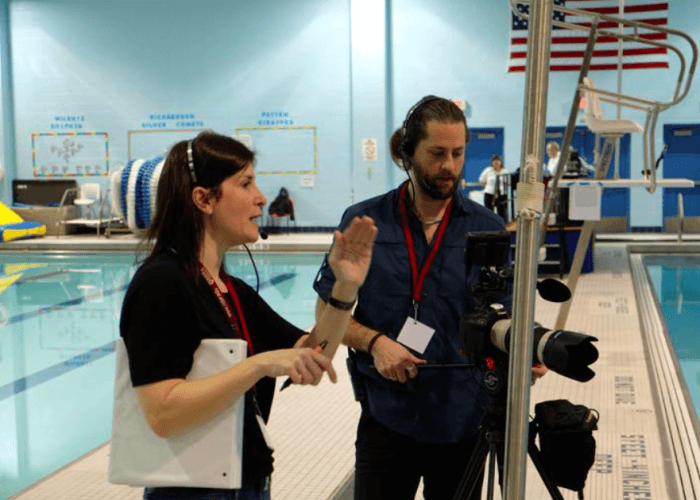
Lara Stolman filming her documentary, SWIM TEAM. Photo Courtesy: swimteamthefilm.com
Swimming World Magazine: Toward the beginning of the film, Mike Jr. talked about being in the water with the Hammerheads and how that was normalizing for him. Could this team have come together over any sport? Why was it swimming?
Lara Stolman: I’m glad you asked that because a number of team parents over the course of the film talked to me about the importance of water. One parent said to me that her son loved the shower, just loved the water so much that she often had a hard time getting him out of the shower.
I did some research while preparing for the film into the benefits of swimming and water therapy for people on the spectrum. There isn’t much in terms of studies, but I heard from families that the pressure of the water feels good for these kids who have sensory issues. And there is a whole population of kids on the spectrum who are on swim teams; I had actually found another team before the Hammerheads, another team entirely composed of kids on the spectrum. The evidence is mostly anecdotal, but there is something about the water—I heard it a number of times and it is something that I’d like to see more studies on.
S.W. Mag: What was the extent of your research into the medical side of autism?
Lara: Well I studied autism extensively but I knew this film wasn’t going to get into ‘what is autism?’ or even explore the specific benefits of swimming for kids with autism. It was more about exploring these characters. I wasn’t even thinking so much about swimming’s benefits as much as the benefits of being on a team. Especially because so many kids on this team had never, before the Hammerheads, been on any team.
I have children and I knew how ostracizing that was because community sports are important to the social life of families in the suburbs. If you don’t participate in community sports your kids and your family might miss out on making connections in the community. These are kids who hadn’t had that experience. They made it into their teen years and had never played little league or soccer, opportunities that we take for granted for our kids. That’s what struck me about this opportunity as a filmmaker, to really look into being part of a team for kids who struggle with social skills.
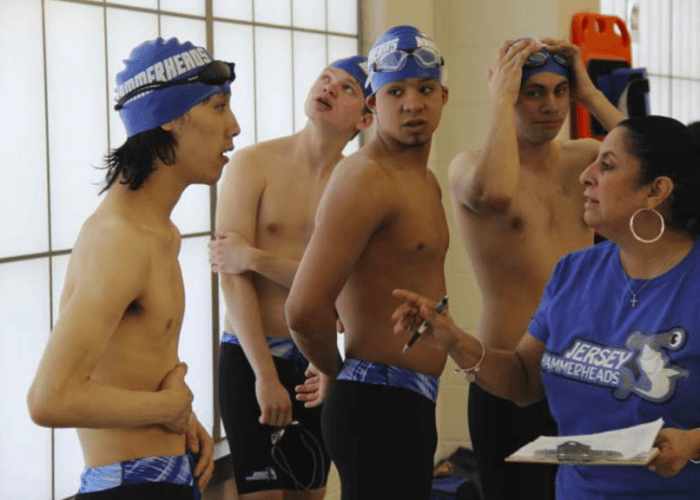
The Hammerheads before their signature event, the 200 medley relay. Photo Courtesy: swimteamthefilm.com
S.W. Mag: The team was definitely a community and an outlet for the parents, too. How much do you see parents’ involvement and growth as a part of this story?
Lara: It was a big part of this story. The families are there the whole time. I don’t know if that’s the case typically, but the families were at every single practice, they were in this together. It was interesting because [the families] were participating—not coaching, it’s not like they were getting up on the deck to coach—but they watched and listened and would talk with one another. They talked about the practice, the upcoming meets, about their lives. Some of the families got very close, whether it was carpooling together or going to each other’s houses for dinner. This was a family thing.
S.W. Mag: And for Coach Mike and Mike Jr., did the coaching dynamic change their father-son relationship?
Lara: There is a point in the film where Coach Mike talks about how working with Mike Jr. has made him a better teacher and father. This whole enterprise, the Hammerheads, has been a very enriching experience for them as father and son. But not just father and son because mom was there too and was very involved. I think you see in the film that the coaching dynamic brought the family closer.
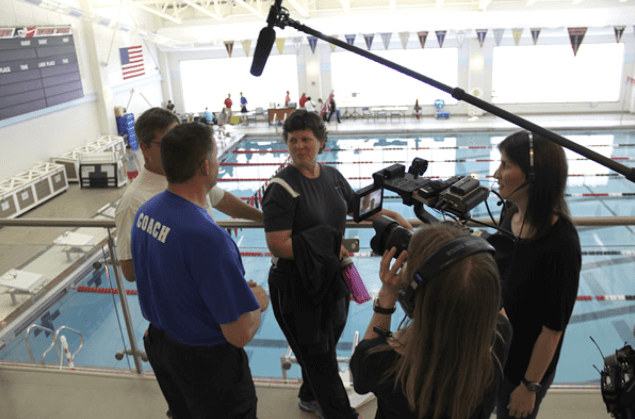
Coach Mike talking to other Hammerhead parents. Photo Courtesy: swimteamthefilm.com
S.W. Mag: What were some of the challenges of being the non-intrusive documentarian that were specific to this space?
Lara: There were definitely some challenges at first. Like they would wave at the camera… All the kids waved at the camera at first. We filmed for the entire swim season; we were there at the first practice of the season through the USA [Special Olympic] Games and we did some filming a year later to follow up and see what was going on with everybody.
Certainly at the beginning there was reticence from the kids and the families. But as we spent more time with the team everybody got more relaxed and could be themselves. We were there a lot and they—definitely over time—they forgot the camera was there. We had the camera and I had my Director of Photography and my sound person, but other times I went to practice with just the GoPros. I would put the GoPros on the kids or in the water, and in that way they felt like they were part of the filming process, which was exciting for them. They always knew I was going to be there, with the crews or just with the GoPros, so I became a part of the team in that way.
S.W. Mag: You’re on the festival circuit right now and have been invited to show at some pretty cool venues. At the Hot Springs Documentary Film Festival in Arkansas you won Best Sports Documentary…
Lara: Isn’t that cool? I thought that was so cool because we’ve been told in the industry that our film is a ‘social issue film.’ But it’s also a sports story. People in swimming and sports get that, but the film-world doesn’t always see it that way. It was thrilling and validating to win that award. When they invited us to participate I was very honored, and it turned out well for us.
S.W. Mag: And you’re also showing at DOC NYC? That’s a very different space.
Lara: Yes, Hot Springs has been around for a while, and they’re prestigious and I had known of their reputation. When we were invited there we were very honored. DOC NYC is in New York, so there’s more industry and press and it’s also very selective and prestigious. But, look, film festivals are hard to get in to. We are lucky and honored to show at both of them. In addition we’re screening at the Napa Valley Film Festival November 10-13 where I was chosen for their Artist in Residence program!
S.W. Mag: You’re also going back to New Jersey, where the film was shot, to show it at the Autism New Jersey Conference.
Lara: Yes, they are a very well-respected conference. They provide cutting edge research in autism education and intervention and information for educators, service providers and parents. We’re happy to be included at their annual conference. We definitely see the film as a tool for outreach. We’re also working with EasterSeals; they provide services to people with disabilities, not just with autism but with all disabilities [check this out for more]. By partnering with them we can reach even more people.
S.W. Mag: What’s the best way for people to see this film?
Lara: It’s showing on November 17 at DOC NYC, so people in the area can visit their website and buy tickets. We are also launching a community screening campaign in conjunction with Autism Awareness Month in April 2017. Any group that wants to show the film can show the film—even in non-traditional settings like a community center, it doesn’t have to be in a theater. Right now you can go to our website and click the button that says “Host an Event” to get started.
S.W. Mag: Is this only for April?
Lara: We’re doing a big push for April, but we’re getting ready now. You can use it to raise money for your swim team or your local autism organization. We want to make people aware of that.
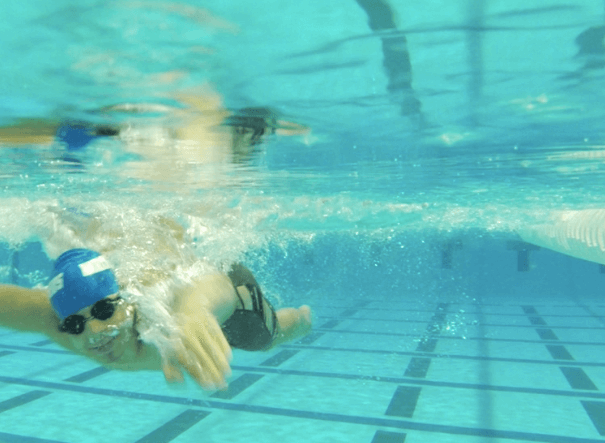
Robbie swimming butterfly. Photo Courtesy: swimteamthefilm.com
–All commentaries are the opinion of the author and do not necessarily reflect the views of Swimming World Magazine nor its staff.–



